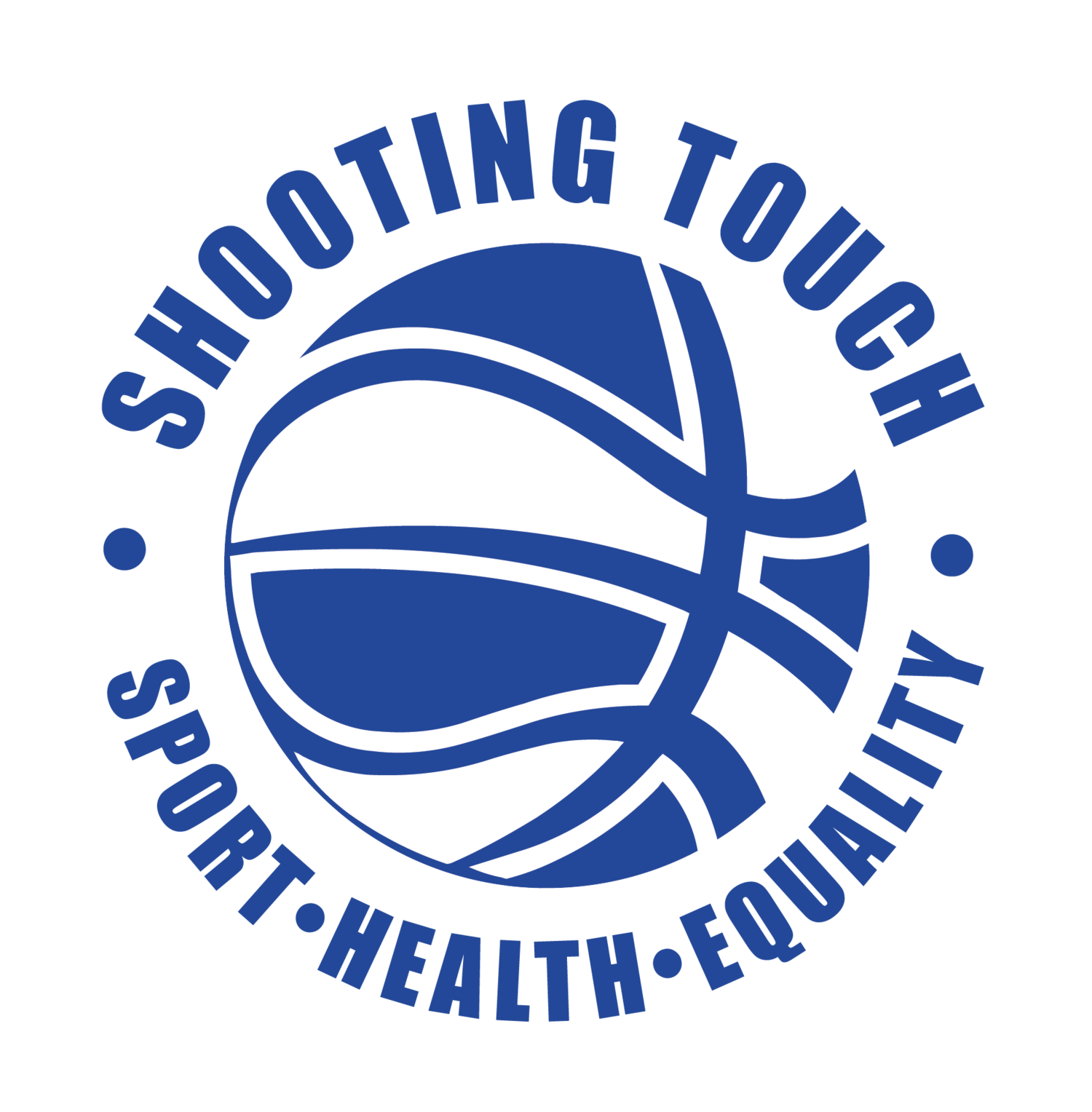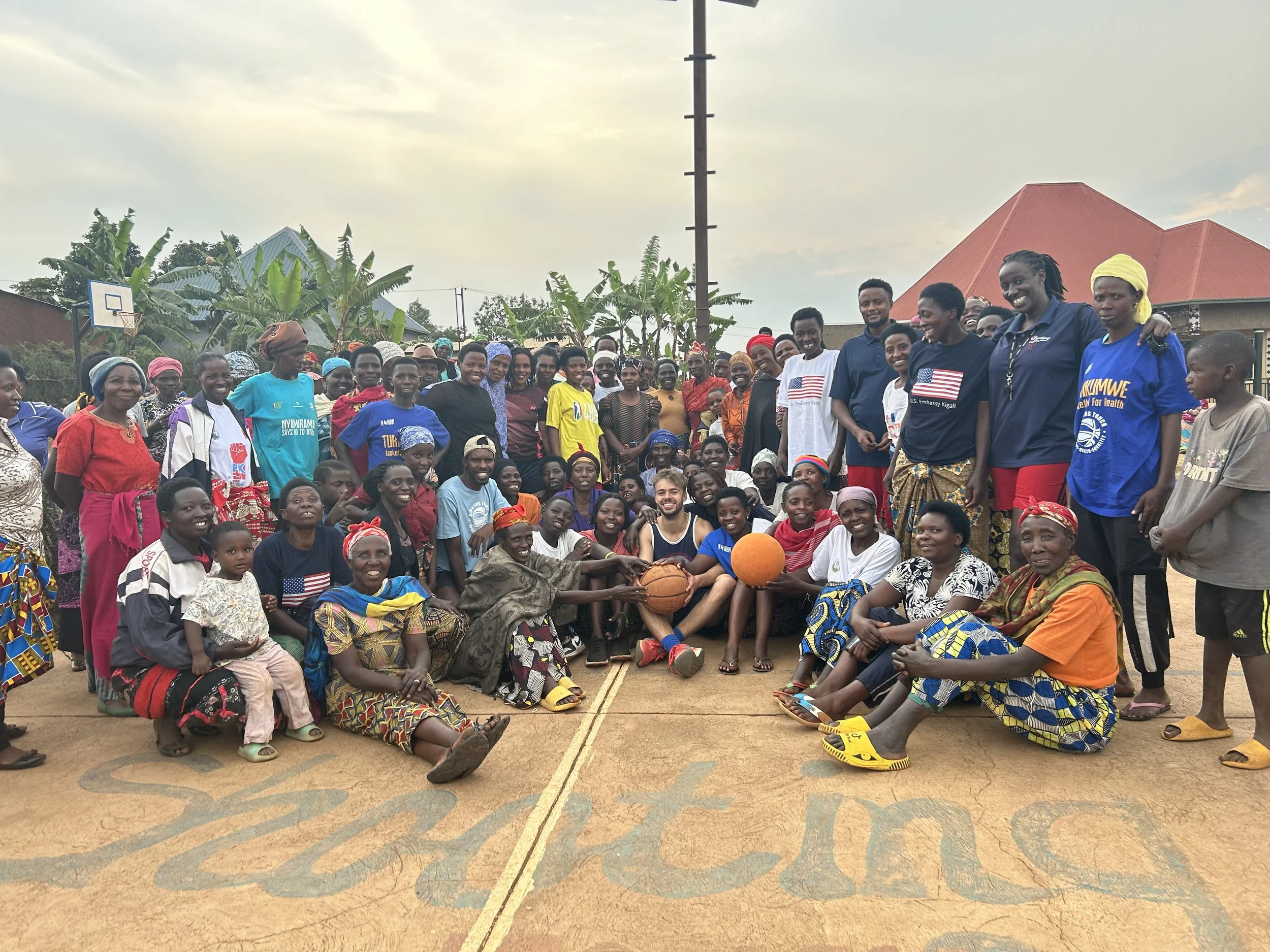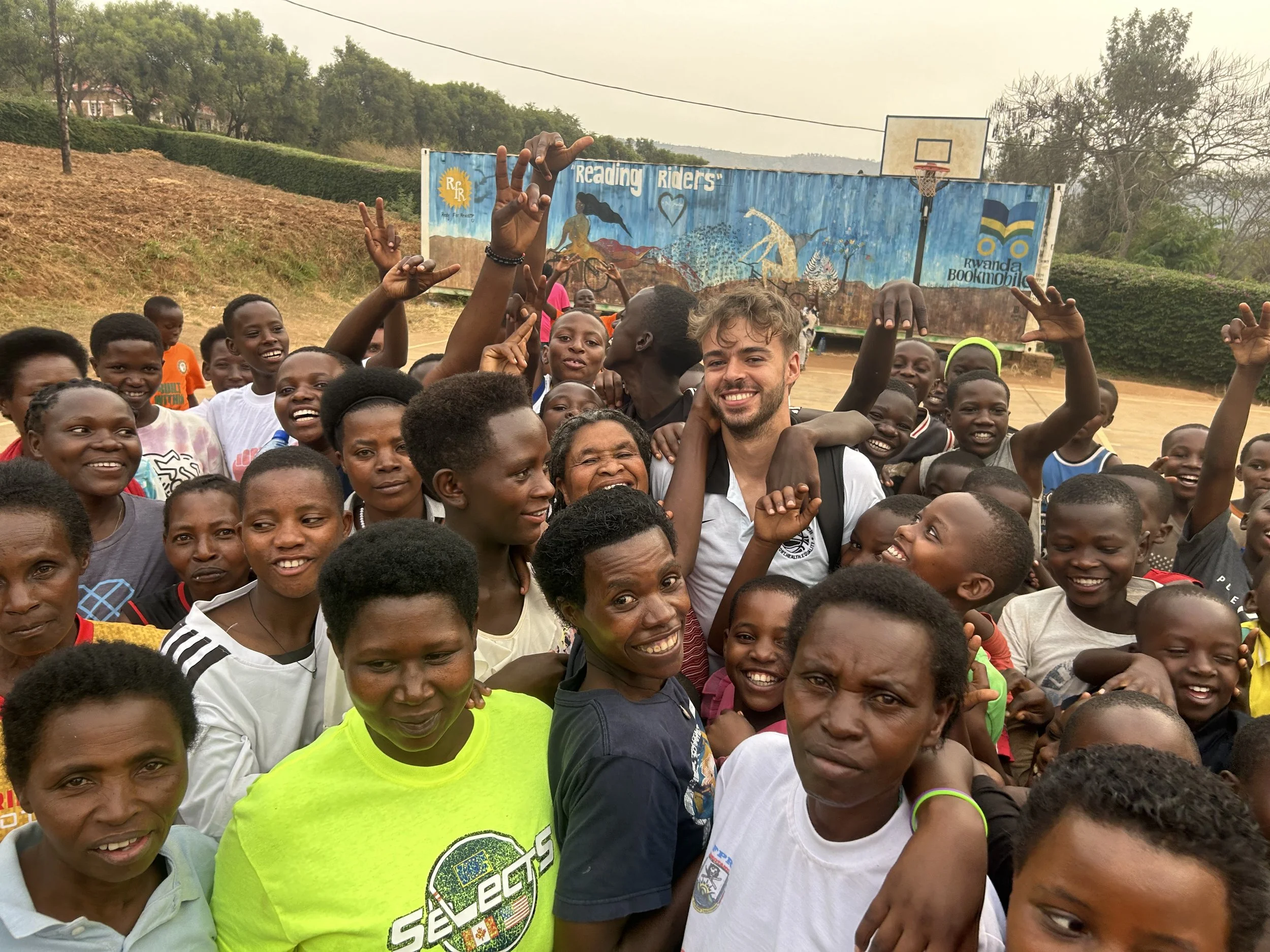The last six months have been nothing short of life-changing, in ways I won’t fully appreciate until I am back to the normalcy of everyday life in America. There have been so many highlights that I’ll forever cherish, from the on-court educational programming and traveling across the country, to simply hanging out with my roommates.
Among the many things that I’ll forever embrace about this experience is the opportunity to dive headfirst into the world of African basketball.
Surprisingly, baseball was my first love. My earliest memories stretch back to playing Tee-ball in Brooklyn, being coached by my dad, and watching Alex Rodriguez and Barry Bonds launch homeruns on TV. My father, who played college ball at Emerson and is now a best-selling baseball author, imparted his love and knowledge of the game to me. On Saturday mornings, I’d throw a tennis ball hundreds of times against the wooden backstop of our backyard to work on my pitching mechanics and fielding. I’d also drive wiffle balls off the tee and chase after them repeatedly to perfect my swing.
I’d always enjoyed playing basketball for fun, but never officially competed until the father of one of my best elementary school friends suggested that I play for his 11U CYO basketball team, arguing that my agility developed playing shortstop could translate well onto the court. He also handed me a DVD copy of Steve Nash’s iconic 20-minute “Real Time” Basketball Workout, and an edition of “More Than A Game,” the famous documentary about LeBron James and his St. Vincent-St. Mary Catholic High School team.
This introduction to competitive basketball coincided with the emergence of a player who propelled my obsession with game around the time I entered middle school: Derrick Rose of the Chicago Bulls. The Windy City Assassin was simply electric, the youngest MVP award-winner in league history. His combination of explosiveness, body control, ball-handling, graceful movement, and finishing ability is one that may never be seen again from another 6’2” guard. I can confidently say that I’ve watched every single D-Rose highlight reel known to man.
There were a couple other guards who influenced me. The first was Jeremy Lin, a Taiwanese-American Harvard graduate who unexpectedly emerged onto the scene when he came off the bench for the New York Knicks and spectacularly led his struggling team to a seven-game winning streak, sparking a cultural phenomenon known as “Linsanity.” The other player is Stephen Curry of the Golden State Warriors, whose three-point shooting ability off the dribble and on the move - on full display when he dropped 54 points against the Knicks at MSG in February 2013 - forever changed the way NBA teams designed their offenses and reimagined the way in which an undersized guard could impact the game.
I was then hooked on basketball, practicing almost every day, and religiously keeping up with highlights from around the league. I also went on to play point guard through high school and intramural basketball at McGill.
However, my love for the sport was pretty much contained within the realm of the United States until one of my friends from university, Sami Al Uariachi - who played point guard for Morocco’s national team - enlightened me about the creation of an exciting new endeavor: the Basketball Africa League. I became captivated by the new league after learning more about the growth of basketball across Africa, as well as the potential economic and cultural benefits that would ensue for the countries involved and the continent as a whole. He then connected me with the BAL’s color commentator, Usher Komugisha, with whom I spoke for an hour over Zoom about her excitement for the space.
Fast-forward to 2024. I’ve been so fortunate to witness Africa’s professional basketball scene with my own eyes. In May, I had the chance to spend two weeks in Senegal with Sam Waterstone, our Director of Communications, and Jerry Ngobi, a Ugandan-American former Shooting Touch fellow and current high school basketball coach in Minnesota. Due to Shooting Touch’s partnership with the BAL as a social impact partner, the three of us were granted VIP tickets throughout the week to watch the top teams from the Sahara Conference.
I attended my first games on May 5th, catching the end of a showdown between Armée Patriotique Rwandaise (APR) and Rivers Hoopers Basketball Club (from Nigeria) at Dakar Arena, a sleek stadium constructed in 2018 with a seating capacity of 15,000 people. The Nigerian team won by a score of 86 - 82.
The following game an hour later was an even bigger treat, a contest between US Monastir (Tunisia) - winners of the BAL championship in 2022 - and Senegal’s AS Douanes. Because AS Douanes had home-field advantage, the stadium was packed and rocking; the crowd was belting chants and blowing vuvuzela horns, while the drumming section danced throughout the entire game. The raucous atmosphere really reminded me of the World Cup due to the incessant buzzing. [Insert clip]
AS Douanes won 76 - 59, led by shooting guard Harouna Abdoulaye, who dropped 35 points, knocking down a blistering eight three-pointers. It was absolute pandemonium when he caught fire in the second half.
I attended several more games over the course of the week, which also provided an opportunity to chat with other individuals sitting at our section, like JC Nkulikiyimura, the Executive Director of Agahozo Shalom Youth Village, a remarkable nonprofit in Rwanda that empowers vulnerable Rwandan youth through top-tier educational opportunities.
Overall, I was impressed by the talent and physicality displayed on the court, though the pace was a little sloppy at times (and there may have been some questionable foul calls). But the games were certainly exciting. For instance, on May 9th, I witnessed AS Douanes defeat Nigeria’s Rivers Hoopers on a fadeaway shot by Mike Fofana at the buzzer to win it. The noise was deafening. [Insert clip]
I was fascinated by the level of the arena show production, which was in line with what you’d expect in the United States or Europe. The sound system was high quality, the dancing performances during timeouts were elite, and the halftime shows featured some of Africa’s most notable hip hop artists, like Senegal’s ISS 814 and Mia Guisse. Furthermore, I enjoyed the Fan Zone right outside the arena, which had food trucks, 3x3 pickup, a DJ, basketball arcade machines, and merchandise sales. It was cool spotting some of the NBA Academy Africa players hanging out, like Khaman Maluach, a 7’2” South Sudanese center and top prospect for the 2025 NBA Draft who will suit up for Duke this winter. [insert clip]
Sam, Jerry, and I also got the chance to attend the BAL Dakar cocktail reception located at Phare des Mamelles, a peninsular lighthouse with scenic views over the Atlantic Ocean. It was neat being in the same room as the industry leaders spearheading the sport across the continent, like Luol Deng and Claire Akamanzi - which also served as a reminder that, at the end of the day, people are people. Everyone dressed up very elegantly, rocking luxurious clothing with African designs. The event wasn’t just about basketball; it was also a Pan-African celebration of African culture and entertainment, as dancers from various countries showcased a diverse array of performances and outfits.
There were lots of interesting artists, athletes, and influencers in attendance. I even shared a ten-minute conversation with Tunde Onakoya, a well-known Nigerian chess grandmaster who set a Guinness World Record for the longest marathon chess game to raise funds for his nonprofit, Chess in Slums Africa, which integrates principles of chess with the management of daily challenges in life. We connected over our love for the city of Tangier and our respective experiences in the nonprofit world. It was very insightful listening to him speak about some of his recent travels and initiatives, but also about the challenges of fame, and his eagerness to return home to his family.
Overall, our trip to Senegal provided further confirmation that the country is among the leaders in Africa’s basketball movement, as evidenced by the enthusiasm in the city - as well as outside of Dakar. For instance, after a full day at the beach in Saly, located on the coast about an hour and a half away from Dakar, the three of us were able to hop in a casual game of pickup basketball and join a group of high school players and their coach for a fun session.
While our trip to Senegal provided inspiring insight about the current state of professional basketball in Africa, I was happy to fly back to Rwanda and re-immerse myself in the grassroots basketball scene with the entire Shooting Touch team.
The rest of May was busy. I hosted a coaching clinic focused on public relations to equip our coaches with the skills to effectively represent Shooting Touch Rwanda. My presentation covered understanding and articulating STR’s mission to various stakeholders and developing essential PR skills. I emphasized tailoring our message based on the stakeholder’s background or interest due to STR’s diverse programs and partnerships across basketball, health, and social change. To reinforce learning, I conducted an interactive activity where coaches were divided into groups to role play different stakeholders, such as a FERWABA coach, doctor from a health center, local government official, a representative from the Imbuto Foundation, or a regular community member who had heard about Shooting Touch.
Later in the month, we hosted a group of students from the University of Tennessee at the Rilima Shooting Touch court for a day of home visits, basketball practice, and a health lesson on the importance of electrolytes for hydration. A kind woman named Athanasie welcomed my group into her home and graciously answered the students’ questions about her decision to participate in Shooting Touch and which health concepts have been most impactful.
The day was capped off by a relay race whereby each group had to dribble a basketball full court and back. Our Director of Programming, Chloe Rothman, also delivered an impassioned speech about Shooting Touch’s unique ability to build community and foster friendships for women, and gave a shout-out to four local leaders in the Rilima community.
On May 31st, we collaborated with the BAL for the second annual BAL4HER activation in Mayange, Bugesera. We bussed 150 girls and young women from Shooting Touch Rwanda’s regular sport-for-health programs to the court for a day of basketball, health education, and community-building. The U-23 BAL4HER women’s team led a basketball clinic, while local gender experts conducted an informative workshop on sexual and reproductive health and rights (SRHR). We distributed reusable menstrual hygiene pads, provided guidance on sustainable menstrual hygiene practices, and announced the BAL’s funding for a new on-site latrine.
It was also great meeting Hannah O’Flynn and Brianna Salvatore Dueck, two dynamic sports business leaders and basketball-focused content creators who brought great energy to the court while showcasing the drills and techniques.
Other noteworthy events include our End GBV Basketball Tournament, organized June 22nd at the Rukara Basketball Court. Over 1,500 community members attended to watch basketball games featuring top STR youth and women from four sectors in Kayonza District. The event also offered free health testing and educational speeches by government officials and local nonprofit partners. The event’s theme focused on the importance of gender equality and related issues, such as gender-based violence and harmful stereotypes - which were tackled in a clever skit performed by youth members of the My Voice My Power program.
And most recently, on July 30, 2024, Shooting Touch Rwanda hosted a community-wide basketball-for-health event at the Nyamirama Court, featuring special guests US Ambassador Kneedler and Grant Williams, a forward for the Charlotte Hornets, NBPA First Vice President, and board member of Shooting Touch. The event included opening remarks from both individuals, group warm-ups, basketball competitions, and ongoing health testing for non-communicable diseases.
It was such a neat experience interacting with an NBA player in such a remote part of the country, and offering a window into our programs. Grant was a great sport, engaging with all beneficiaries and even challenging them to games of 1v1. While I like to take pride in my defensive competitiveness, it was pretty cool being on the receiving end of a Grant Williams step-back three right on my head.
The following two days were equally memorable. In Rwinkwavu, I led a group warm-up alongside Grant and coach Diane for the 100+ female beneficiaries circled around the court, doing jumping jacks while singing a Rwandan chant. That will always be a funny moment I’ll never forget. And the following morning, I was in attendance for a conversation hosted by the US Embassy in Rwanda with Grant, who spoke about how basketball can build community, influence social change, and drive economic development - especially in regards to Africa’s growing basketball industry.
There have been plenty of other basketball-related moments that I’ll hold near and dear to me, like watching Jerry carry out a practice at a local high school, or playing full-court pick-up basketball at night in Nyamirama and Nyarutarama. [insert video of Jerry]
One of my most treasured memories was before a women’s practice in Nyamirama, about halfway through my fellowship. I was standing next to coach Nicolas, who was addressing a large group of female beneficiaries. For whatever reason, Nicolas had to take care of a matter, which momentarily left me alone in front of this crowd staring back at me.
Clearly, there was a huge language barrier, and I had no idea what to say or do. So I expressed “Mwiriwe,” or “good afternoon,” to which they responded “Mwiriwe neza!” I then asked them “amakuru,” or “how are you?” They were pleasantly surprised that I knew at least a bare minimum of Kinyarwanda and they all smiled and responded “meza neza,” or “we’re good!”
In turn, they asked me how I was doing, to which I responded, “meze fresh!” a very informal way of stating “I’m great!” The expression amusingly caught them off guard, and they all burst into laughter and clapped, making me feel like prime Eddie Murphy.
But as light-hearted as that moment was, it was also a profound display of generosity, making me feel welcomed and appreciated for my effort to connect in their language. It highlighted the warmth and openness of the community, which was apparent to me from the very first day.
As my fellowship nears its completion, I am continually amazed by the vibrant basketball culture in Africa and the profound impact it has on communities, both across the continent as well as here in Rwanda. The past six months have not only deepened my love for the game, but also broadened my perspective on its global influence - as well as on local communities.
It’s truly been a privilege to witness history in the making and observe the dedication of players, coaches, and fans across the continent. I’m eager to contribute further and carry these unforgettable experiences with me wherever my journey takes me next.




